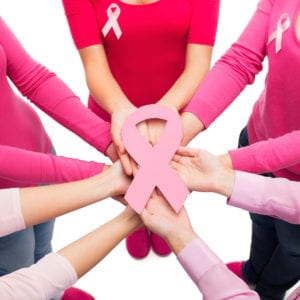Written by Jessica Patella, ND. This case-controlled study found a strong correlation between alcohol, obesity and stress, and no correlation between stress and breast cancer; however, a 25% increase in breast cancer was found in obese women between 31 and 40 years of age.
 About one in eight women in the United States will develop invasive breast cancer over the course of her lifetime 1. For women in the United States breast cancer death rates are second highest, lung cancer being the first 2. Recent research has found a correlation between alcohol consumption and obesity in middle-aged women with an increased risk of breast cancer 2.
About one in eight women in the United States will develop invasive breast cancer over the course of her lifetime 1. For women in the United States breast cancer death rates are second highest, lung cancer being the first 2. Recent research has found a correlation between alcohol consumption and obesity in middle-aged women with an increased risk of breast cancer 2.
The incidence of breast cancer in Australian women has tripled in the past five decades, which is why this study was conducted 3. Two commonly known risk factors for breast cancer are alcohol consumption (alcohol is classified as a Group 1 carcinogen) and obesity possibly due to the elevated estrogen hormone 2,4-6. While these have been studied independently, this is the first study to examine the interaction of alcohol, obesity and stress with breast cancer 2.
Ecological data was gathered using National Health Survey results in Australia. Case-control data was gathered and included 315 Australian women from 45-70 years of age. The cases (n=80) were women that were first diagnosed with breast cancer in the last 5-years and the controls (n=235) were women in the same age range with no history of breast cancer 2.
All case-control participants completed an anonymous survey relating to the participant’s lifetime alcohol consumption, weight history, psychological stress and demographic information. Psychological stress was based on the List of Threatening Experiences questionnaire that measures stressful life events in 12-categories, including being fired from a job, major financial crisis, serious injury, etc. Each category was broken down into decades from age 18 to their current age.
The Ecological results showed an increasing incidence of breast cancer, alcohol consumptions and obesity. Steeply increasing rates of overweight occurred until 1995 but have been declining since then. Although population stress data has only been recorded since 2001, there is a decreasing trend for high to very high stress. These results showed a strong positive correlation between breast cancer and alcohol consumption (p<0.001) and a moderate correlation between breast cancer and obesity (p<0.001) 2.
In the case-control results there was no association found between alcohol consumption and breast cancer. The only correlation with obesity and breast cancer in the case-control results was when women were obese from 31-40 years of age there was a 25% increase in breast cancer. There was no correlation found between stress and breast cancer but there was a strong correlation between stress and alcohol consumption and obesity 2.
It is important to note that there is the possibility of ecological fallacy meaning that what is true at the population level may not be true at the individual level. There is also the possibility that the women underestimated their weight, thus skewing the results 2.
In conclusion, there is ecological evidence for moderate to strong correlations between obesity and alcohol consumptions and breast cancer incidence 2. The case-control results show an association between obesity in women in their thirties and later developing breast cancer 2. This evidence supports preventing obesity in younger women and potentially reducing alcohol consumption throughout the lifetime for women 2.
Source: Miller, Emma R., C. Wilson, J. Chapman, Ingrid Flight, A-M. Nguyen, Chloe Fletcher, and Ij Ramsey. “Connecting the dots between breast cancer, obesity and alcohol consumption in middle-aged women: ecological and case control studies.” BMC public health 18, no. 1 (2018): 460.
© Creative Commons Attribution 4.0 International License (http://creativecommons.org/licenses/by/4.0/) (http://creativecommons.org/publicdomain/zero/1.0)
Click here to read the full text study.
Posted May 18, 2018.
References:
- BreastCancer.org. U.S. Breast Cancer Statistics. http://www.breastcancer.org/symptoms/understand_bc/statistics. Accessed May 16, 2018., 2018.
- Miller ER, Wilson C, Chapman J, et al. Connecting the dots between breast cancer, obesity and alcohol consumption in middle-aged women: ecological and case control studies. BMC public health. 2018;18(1):460.
- Colditz GA, Bohlke K. Priorities for the primary prevention of breast cancer. CA: a cancer journal for clinicians. 2014;64(3):186-194.
- Chiara Scoccianti BL-S, Pierre-Yves Bello, Véronique Chajes, Isabelle Romieu, Isabelle Romieu. Female Breast Cancer and Alcohol Consumption. American Journal of Preventative Medicine. 2014;46(3):S16-S25.
- Organization WH, Cancer IAfRo. IARC monographs on the evaluation of carcinogenic risks to humans. Vol. 44. Alcohol drinking. Summary of data reported and evaluation. Lyon: IARC, 1988.
- Kulie T, Slattengren A, Redmer J, Counts H, Eglash A, Schrager S. Obesity and women’s health: an evidence-based review. The Journal of the American Board of Family Medicine. 2011;24(1):75-85.

